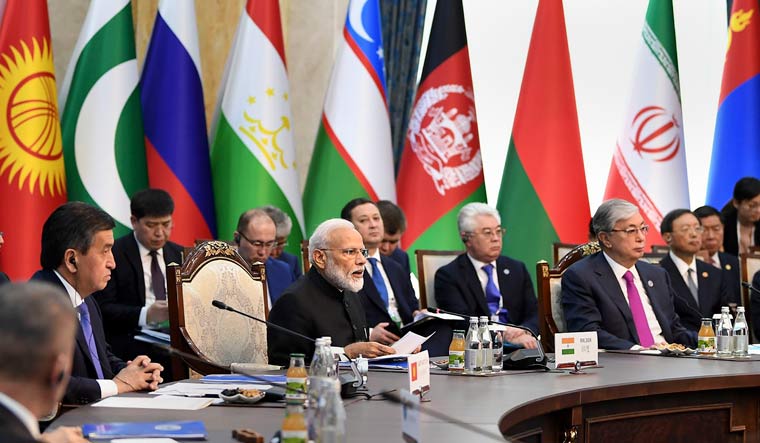Prime Minister Narendra Modi pointed fingers at Pakistan, without naming the neighbour, during his address at the Shanghai Cooperation Organsitaion (SCO) summit in Bishkek on Friday. Calling for an international meet on combating terror, he said countries supporting, aiding and sponsoring terrorism should be held accountable. Modi said India stood for a terror-free society.
Modi has had bilaterals with Russia, China, Iran and Afghanistan (the latter two being observer nations) as well as pull-aside meetings with Kazakhstan, as well as with Belarus and Mongolia (the latter two being observer nations). He also had a bilateral meet with his Kyrgys counterpart. Modi's visit to Bishkek was for both the SCO and the Indo-Kyrgyx bilateral meet. However, there was no interaction with Pakistani Prime Minister Imran Khan, though the latter has sent out feelers of engaging with India now that the elections are over.
Also read
- With disengagement along LAC almost over, India-China troops exchange sweet | In pics
- At UN, India calls out Pakistan for ‘mischievous provocation’ and ‘political propaganda’
- Ladakh: Back to barracks for India, China soldiers by Tuesday
- India, China pull back troops; begin disengagement at Demchok and Depsang in eastern Ladakh
It has been part of India's strategy to try and isolate Pakistan at every multi-lateral forum over its inaction over sponsoring terror.
The SCO, however, is not just another platform for Pakistan bashing. It means a lot more to India. As Secretary, West, A. Gitesh Sarma had earlier explained, the SCO provides India with a structured platform to engage with Central Asia. The SCO has eight member nations—India, Pakistan, China, Russia, Uzbekistan,Tajikistan, Kazakhstan and Kyrgyzstan, which together account for 42 per cent of the world's population, 22 per cent of its land and most importantly, 20 per cent of the GDP. For India, which has anyway been stepping up its engagements with Central Asian republics individually, too, this region provides great potential for establishing its stamp, as well as a market for its produce. India's ties with Central Asia are historical. But history can only take you that far. For relevant partnerships, the present and future need to be engrossing. With the breaking up of the USSR, individual republics needed to be cultivated individually. SCO helps India reach out to many of them at one go.
With two superpowers, Russia and China, in the grouping, the SCO has the potential to become an important platform in future.
SCO, which was initiated by China, has at its base, connectivity as an important objective. This again is in sync with India's connectivity requirements. India is a big stakeholder in the North South Transit Corridor, for instance, the Chabahar port in Iran that India is developing being an important part of the initiative. Central Asia also gives India alternate access to Afghanistan. The SCO gives India a presence in an area where China wants to stamp its economic and other influences, including the Belt and Road Initiative. As one diplomat had said earlier, it is better to be inside the room than outside.
India became a full fledged member of the SCO two years ago. Russia had facilitated its entry. However, Pakistan was also given entry at the same time with the help of China. Had it not been for this eventuality, India would have been able to have two regional groups, the BIMSTEC to its east, and the SCO to its west, without Pakistan. That, however, has not happened. The other regional grouping, SAARC, could not take off because both nations kept bringing their individual issues to the group. SAARC is all but dead now. The structure of the SCO will not allow contentious bilateral issues to be brought to the table here. The SCO prides itself in conducting its meets in a friendly atmosphere. There are advantages of both rivals being part of such groupings, because they provide occasion to defuse tensions, with bilaterals or pull-asides on the sidelines. This time, it has not happened. But later in September, all SCO nations will have a military meet in Russia, as they did last year. India, in the true Shanghai spirit that dominates the SCO, will have to send some troops for the exercise, as will Pakistan. Another occasion to defuse tensions.
SCO's strong anti-terror, anti-separatism and anti-extremism focus is again in line with India's thinking. The SCO's Regional Anti Terror Structure (RATS), which is based in Tashkent, helps pool resources and intelligence. SCO also has a similar approach to India regarding rebuilding Afghanistan.



